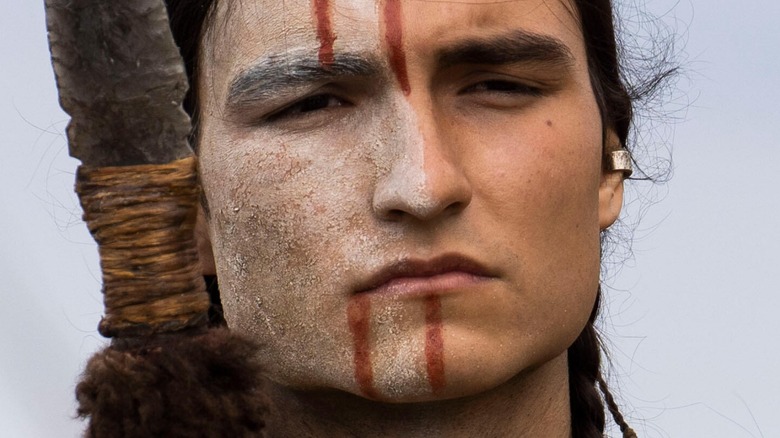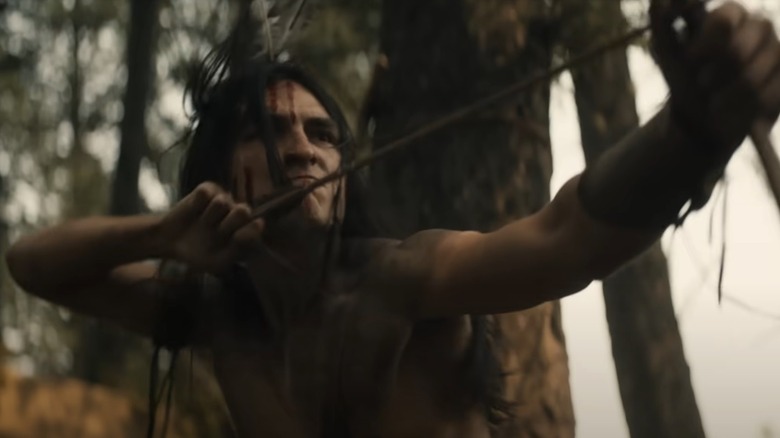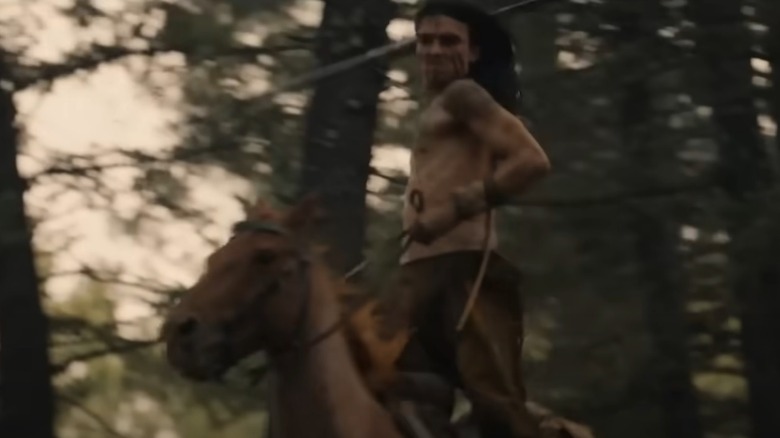Dakota Beavers On Historical Accuracy, Horseback Riding, And Being A Good Brother In Prey - Exclusive Interview
20th Century Studios' newest outing, "Prey," sees a Comanche community at threat from a Yautja, the apex alien predator species of the "Predator" film franchise. At the forefront of challenging the alien menace are Naru (Amber Midthunder) and her older brother, Taabe (Dakota Beavers), a pair of siblings looking to protect their community and wanting a challenging hunt of their own. It's an exceptional action-horror outing with impressive attention to detail in its treatment of a community 300 years in the past.
As a character, Taabe is key to sister Naru's journey and in the hunt against the extraterrestrial predator. Looper spoke with co-star Dakota Beavers in an exclusive interview about the siblings' relationship, his extensive training for the role, the film's elaborate attention to detail involved in capturing the Comanche community in that era, and how "Prey" propels the "Predator" franchise forward by moving it back to the past.
Jhane Myers was the number one reason behind Prey's accuracy
How did you come to join "Prey"?
I came in a roundabout way; the stars kind of aligned. I got an email and I did a few auditions, and then they shipped me out to LA to do an in-person audition, and luckily it turned out for the good. Now, wouldn't you know it, I'm in a "Predator" movie and I'm more than happy — I'm ecstatic.
Were you a fan of the franchise coming into it?
My experience stemmed mostly from the first one, so I had seen Arnold Schwarzenegger and the rest of those muscle-bound boys. After I had got the part, I went back and I watched all the other ones, and now I'm a fan for life.
Your character, Taabe, comes back from his first hunt anointed in the tribe, but then he continues to support Naru in her journey even when it's not popular. That was a really interesting dynamic. Could you tell me about their relationship?
It was important to me that Taabe not just be another older brother who was angry and jealous, and "You can't do that, I'm the big boy here," because we've seen that so many times. I wanted [him] to be someone who was supportive and loving, yet a strong and masculine guy, but he knew his sister's talents and he wanted her to succeed. He wanted her to feel fulfilled in life, so that was really important to me, and I was so thankful that it translated that way in the end.
It also felt like "Prey" was committed to historical accuracy, representing tribal activities and traits in an accurate way. Can you talk to me about what steps they took to keep things feeling grounded and authentic?
One of the first things that was integral to making this movie was having Jhane [Myers] head up the project with Dan [Trachtenberg], being a Comanche woman herself who is there to say, "This is right, this isn't right"; "This looks good, this doesn't look good"; and to be there for the actors.
She's like a top-tier auntie. She's there for all the people. She was there for me. Any time I was hungry, man — because they had me on a strict diet — she'd deliver pizzas to my room to make sure I was eating. But Jhane was the number one reason why this film was as accurate as we could make it, and I am so thankful and proud to know her.
Horseback riding was one of Dakota's favorite experiences on sets
I loved your character's final scene, with the horse-riding combat. What preparation went into that scene for you, and what other preparations did you have to undertake to embody your character?
There were obviously your regular preparations — we did a four-week boot camp with myself, Amber [Midthunder], and the boys, using the bows, learning how to roll if our character needed to roll correctly. For me, [it was] a lot of horse riding.
There was a point in the middle of the movie where I wasn't in a lot of the scenes, so I would go out with the horse wrangler, Mark Nugent, and I would just ride. We would ride all over the wilderness of Alberta. Man, we'd find deer sheds. We'd ride up on wild horses, and it was easy-going. He would never overly try and coach me; he would let me do my thing, so you develop a comfort and a peace. That was one of the best parts for me.
This particular film is so interesting because in going into the past, it's the first film to take the blank check of the canon franchise's premise and put a Yautja back in time against a historically badass society. Do you think that this is something the franchise could continue to do?
Yeah. I thought it was a cool way to mesh things that hadn't been meshed before. It's two things that people seem to find fascinating. Throughout the world, people find Native American culture fascinating — it hasn't always been depicted correctly, but people are fascinated nonetheless.
People are [also] interested in science fiction and Predator culture as well, so putting the two together in a way like never before was pretty genius ... but taking it back 300 years gives you endless possibilities for new takes on it. You could go to so many different places that we've never seen before, and I hope it inspires filmmakers to do that.
I know there are an increasing number of popular projects like "Reservation Dogs" and "Rutherford Falls" that center Native American creators and communities. There surely isn't enough representation, but there are certainly some great examples. Where do you feel things are at in that regard, and where you would like them to go?
There's certainly some new wind behind the sails there because people have an interest in it, and if you can execute it in a way that is good and accurate and also entertaining for the people — like [how] "Reservation Dogs" or "Dark Winds" were really good — and then this movie [is] ... Filmmakers will, I hope, start to see "Wow, we can use these guys a little more than we have in the past." Hopefully, they'll take that to all aspects of people and realize that people like to see new things, and they like to see different kinds of people. I'm excited for the future of all that.
"Prey" releases August 5 on Hulu.
This interview was edited for clarity.


